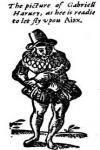Career
Other info : Bibliography
He became reader in rhetoric in about 1576, and in 1578, on the occasion of Queen Elizabeth's visit to Sir Thomas Smith at Audley End House, he was appointed to dispute publicly before her. In the next year he wrote to Spenser complaining of the unauthorized publication of satirical verses of his which were supposed to reflect on high personages, and threatened seriously to injure his career. In 1583 he became junior proctor of the university, and in 1585 was elected master of Trinity Hall, of which he had been a fellow from 1578, but the appointment appears to have been quashed at court. He was a protégé of Robert Dudley, Earl of Leicester, to whom he introduced Spenser, and this connection may account for his friendship with Sidney. But in spite of patronage, a second application for the mastership of Trinity Hall failed in 1598.
In 1585 he received the degree of D.C.L. from the University of Oxford, and is found practising at the bar in London. Gabriel's brother, Richard Harvey, had taken part in the Martin Marprelate controversy, and had given offence to Robert Greene by contemptuous references to him and his fellow wits. Greene retorted by inserting a few lines in the first edition of his A Quip for an Upstart Courtier containing scathing remarks on the four Harvey brothers, drawing attention, among other things, to the fact that they were the sons of a ropemaker.[5][6] In 1599 Archbishop Whitgift made a raid on contemporary satire in general, and among other books the tracts of Harvey and Nashe were destroyed, and it was forbidden to reprint them. Harvey spent the last years of his life in retirement in Saffron Walden, dying in 1630.
The Letter-Book of Gabriel Harvey, AD, 1573-80 (1884, ed. EJL Scott, Camden Society), contains rough drafts of the correspondence between Spenser and Harvey, letters relative to the disputes at Pembroke Hall, and an extraordinary correspondence dealing with the pursuit of his sister Mercy by a young nobleman. A copy of Quintilian (1542), in the British Museum, is extensively annotated by Harvey.
Harvey was also a wordsmith and has been credited with the coining or first use of the word "jovial" (derived from the Latin for "pertaining to Jove or Jupiter"), circa 1590, as well as the words "conscious", "extensively", "idiom", "notoriety" and "rascality". This claim is supported by the criticism of rival Thomas Nashe, in which Nashe cites Harvey as the creator of the words, announces his dislike of Harvey's words, and then predicts Mr. Harvey's words will not stand the test of time. Noted Etymologist Robert Hendrickson also cites Harvey's hand in creating these words in his book "The Facts On File Encyclopedia of Word and Phrase Origins"(Checkmark Books)






